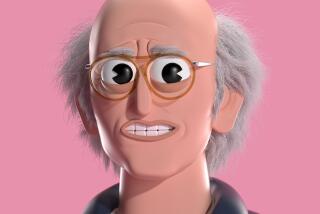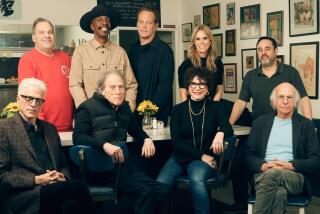Curmudgeons? Here, the Scorn Is Green
- Share via
Why is it that, in the United States of America, where free speech is not only tolerated but glorified, we have so few curmudgeons?
We have a few. Mort Sahl. Mike Royko. Rubin Carson. Burt Prelutsky is perhaps the closest thing we have to a real, old-style, dyspeptic, unrelenting, misanthropic curmudgeon, as the title of his most recent book, “Civilization and Welcome to It,” implies.
But no one keeps mocking our manners and morals daily, with a national voice, the way H. L. Mencken did in the ‘20s and ‘30s. Mencken was a curmudgeon of the old school. The world was his bad oyster. To him the American people were the “booboisie” and our civilization was “the greatest show on earth.”
“The American people,” he grumbled, “taking one with another, constitute the most timorous, sniveling, poltroonish, ignominious mob of serfs in Christendom since the Middle Ages.”
Not only do we have no national figure daily heaping scorn on politicians, businessmen and clergymen, as Mencken did, we have very few political satirists who show us as we really are.
Art Buchwald inverts reality to expose our fraudulence and our posturing, but the result is gentle laughter, not shock. Though Mencken could make us roar with laughter at ourselves, he was not essentially a humorist. He was more of a scold and a reformer who had despaired of reform.
Garry Trudeau reveals our political heroes to us as scamps, con men and poltroons, and again we are more likely to laugh than to recoil at the ugliness of the revelations.
Mencken’s style was inimitable. He combined visionary perception with an inexhaustible and unerring vocabulary and a command of syntax that could give a 200-word sentence the momentum of a locomotive. Though he despised organized religion (he invented the term “Bible Belt”), to the idealistic young intellectuals of the 1920s he was a religion in himself.
In his recent book “The Portable Curmudgeon” (New American Library), Jon Winokur celebrates and quotes curmudgeons of past and present, conceding that Mencken was the “quintessential curmudgeon.”
The word is of unknown origin, he says. In its archaic sense it meant “a crusty, ill-tempered, churlish old man”; in its modern sense it means “anyone who hates hypocrisy and pretense and has the temerity to say so; anyone with the habit of pointing out unpleasant facts in an engaging and humorous manner.”
Winokur lists 66 “world class curmudgeons,” but most of them--including Fred Allen, Tallulah Bankhead, Robert Benchley, Westbrook Pegler, W. C. Fields, Groucho Marx and Ambrose Bierce--are dead. Still among the living are Woody Allen, William F. Buckley Jr., Jules Feiffer, Fran Lebowitz, Gore Vidal, Sahl, Royko and George F. Will.
I would disqualify Will and Buckley because there are too many things they like. A true curmudgeon finds almost nothing to praise in our society, although he seems to derive great joy from lambasting it.
There was probably no happier man than Mencken. I don’t remember whether Mencken approved of baseball, as Will does, or of sailing, as Buckley does, but I doubt it. I suspect that to him all sports were pastimes of the booboisie. A true curmudgeon, George Bernard Shaw, once said of baseball that “it has the great advantage over cricket of being sooner ended.”
I’m not a curmudgeon. I’m too sweet and gentle and I like baseball, sailing and women.
I am not suggesting that Buckley and Will do not like women, and despite his apparent misogyny (“If I ever marry, it will be on a sudden impulse--as a man shoots himself”) Mencken married a beautiful college instructor at 50 and lived happily with her until her death five years later from tuberculosis.
One must concede that curmudgeons, though they abhor the world they live in, sometimes have an inflated idea of their own worth. Winokur quotes Shaw as saying that “With the single exception of Homer, there is no eminent writer, not even Sir Walter Scott, whom I can despise so entirely as I despise Shakespeare, when I measure my mind against his.”
Prelutsky doesn’t even have a kind word to say about our common profession. He says he didn’t set out to be a columnist, an essayist, a writer of short pieces. “That perverse I’m not. I mean, does anyone really set out to be inconsequential, to be the literary equivalent of those strange ducks who spend their lives transcribing the Lord’s Prayer on the head of a pin?”
Don’t let him kid you. He loves it.
More to Read
Sign up for our Book Club newsletter
Get the latest news, events and more from the Los Angeles Times Book Club, and help us get L.A. reading and talking.
You may occasionally receive promotional content from the Los Angeles Times.









